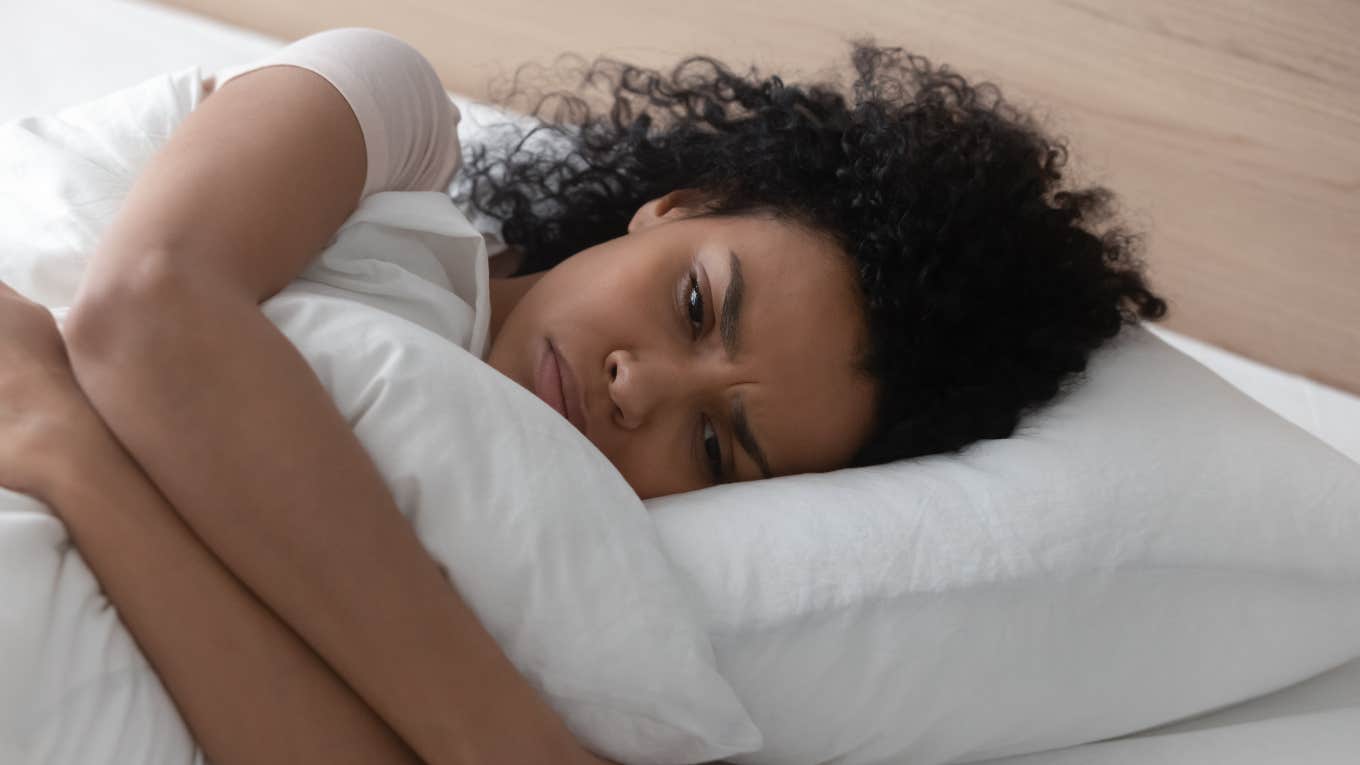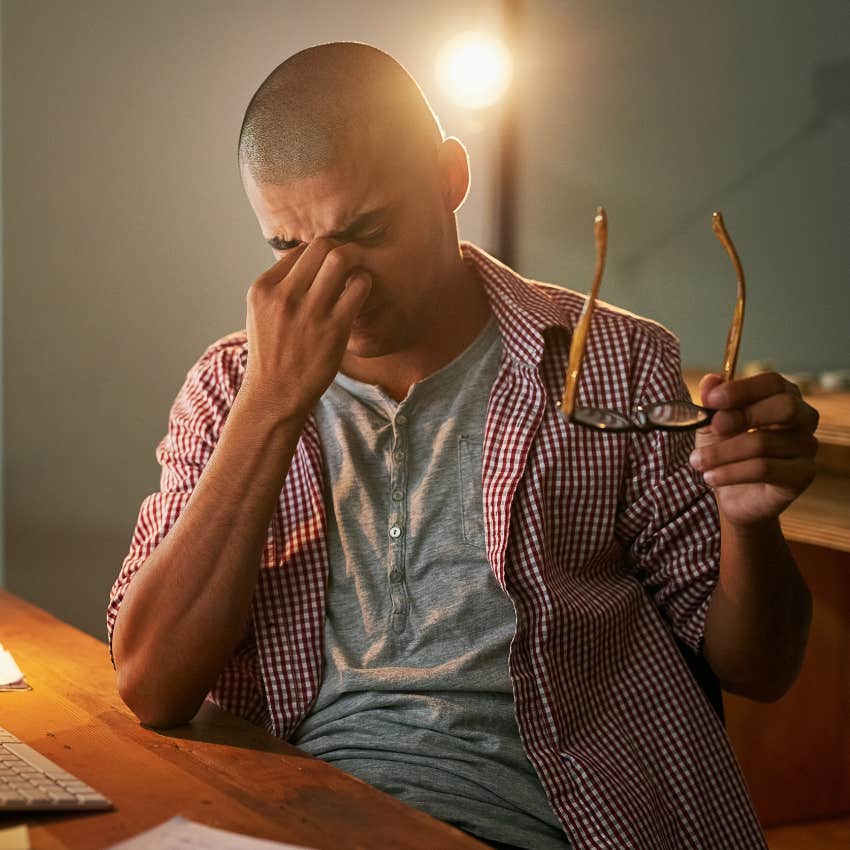7 Subtle Signs You Have 'Morning Anxiety'
Do these morning struggles sound familiar?
 fizkes | Shutterstock
fizkes | Shutterstock Many people feel immediately tense and anxious the very second they wake up. It’s a phenomenon called “morning anxiety,” in which the body wakes up immediately pulsing with the stress hormone cortisol.
This stress hormone naturally spikes to help you get up and going in the morning. However, according to counselor and author Rebekah Ballagh, "If you are someone who already has higher levels of stress hormones in your system, that extra flush of cortisol can tip you into a spiral of anxiety."
Here are 7 subtle signs you have morning anxiety:
1. You wake up still tired or lethargic
While many of the symptoms of morning anxiety, including waking up tired or lethargic, likely feel normal or expected, Ballagh insists, “Your mornings don’t have to be so tough.”
Craft a thoughtful morning routine to ease your a.m. anxiety and feel better rested. Consider investing in a gradual alarm clock, eating breakfast, and steering clear of caffeine for an hour after waking up — even better if you stay off your phone and get some sun instead.
 Jelena Zelen | Shutterstock
Jelena Zelen | Shutterstock
2. You're nauseous or bloated in the morning
Anxiety doesn’t just manifest in your mind but as physical symptoms in your body as well. A common anxiety symptom is nausea, and morning anxiety is no different.
To manage these uncomfortable morning feelings, adopt routines that prioritize your rest, like meditation and other deep breathing exercises.
3. You have brain fog
Brain fog is a loosely used term for feeling “groggy” or unfocused throughout the day. Due to a cloudy mental sensation, focusing on your work or thinking clearly feels impossible.
 People Images Yuri A | Shutterstock.com
People Images Yuri A | Shutterstock.com
Brain fog can be targeted with exercise, increased sleep, meditation, and a diet high in energy-boosting foods.
4. You feel an ‘overwhelming’ dread when you wake up
Some people describe it as a “heavy feeling” on their chest or an oncoming panic attack, but this “overwhelming dread” is often a reflection of our body’s stress hormones hitting us all at once.
“I thought I was the only one,” a TikTok commenter admitted. “I wake up every morning super anxious, with my heart pounding.”
While it might seem incurable — a result of our anxiety disorders, work stress, or lifestyle — the truth is that these feelings are almost always a reflection of other symptoms.
From lacking sleep to bad diets to a general failure to show up for ourselves, our morning anxiety reflects all the consequences of those gaps. Luckily, that means there are things you can do to reduce these uncomfortable feelings.
5. You self-soothe with your phone in the morning
For many, it's merely instinct to grab your phone and check your notifications the minute you open your eyes in the morning. You likely don't even think about it.
However, this mindless distraction is likely making for a.m. anxiety even worse. Not only does being on your phone first thing in the morning affects your cognitive abilities and concentration, but it also overloads your brain with information before it’s capable of processing and managing it, inevitably sparking heightened stress in the body.
 Andrii Nekrasov | Shutterstock
Andrii Nekrasov | Shutterstock
As challenging as it may seem, try to avoid spending time on your phone after waking up. Scrolling on TikTok or even reading the news can wait. Instead, sit with your feelings and thoughts and give yourself grace when it comes to starting your day.
6. You’re not hungry in the morning
Research shows that the increased stress hormones in your body result in decreased levels of hunger and severe changes to your appetite. Alongside fatigue and brain fog, it’s unsurprising that those suffering from morning anxiety also don't feel hungry enough for breakfast in the morning.
However, it’s a toxic cycle. When you don’t eat breakfast in the morning, you set yourself up for a lack of energy later in the day and fail to balance your body’s stress after waking up.
It's important to eat in the morning to fuel your body and manage your stress in a way that can inevitably help your morning anxiety. Even if it’s just a piece of toast before you drink coffee, it can help you to feel more regulated.
7. You’re rushing around or starting your day quickly
This is so common that there's a name for it — hurry sickness. Constantly rushing around, especially early in the morning, is damaging to your body and mind.
According to mental and emotional health expert Dr. John Delony, "We've created anxious lives for ourselves that, quite frankly, our bodies can't exist in."
Do your best to relax in the morning, even if that means waking up a tad bit earlier or sacrificing a few of your "snoozes." Give yourself time for a thoughtful morning routine and eat an energy-inducing breakfast. Journal, meditate, or get some movement in before diving straight into work or school.
Find ways to prioritize yourself, what makes you feel good, and what fulfills you, even if it’s uncomfortable at first to create those habits. Taking care of your mind and reducing anxiety starts with taking care of your body, which starts the second you wake up.
Zayda Slabbekoorn is a News & Entertainment Writer at YourTango who focuses on health & wellness, social policy, and human interest stories.

